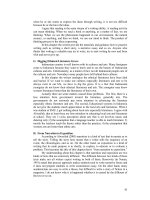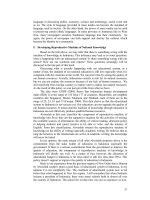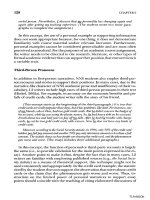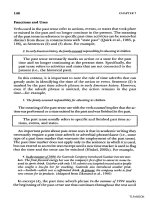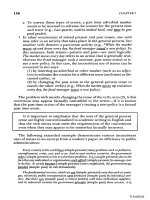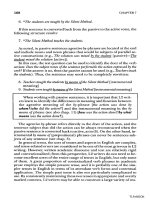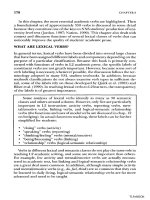Tài liệu Teaching and learning english part 12 pdf
Bạn đang xem bản rút gọn của tài liệu. Xem và tải ngay bản đầy đủ của tài liệu tại đây (404.35 KB, 7 trang )
78
References
BBC World Service (2002) Share your day with BBC World Service
/>28 November 2006]
Education Development Center. (2006) Interactive Radio Instruction (IRI) (on line)
/> [15 November 2006]
Josiah I.
Education Through Radio: Women's Aid Organization in Malaysia use
radio to fight domestic violence
(on line)
/wia/wia298/com00005.html [21 November 2006]
Thompson G, Nwaerondu NG . (1996).
The Use of Educational Radio in
Developing Countries:
(on line)
/history/faculties /28novradio.htm. [28 November 2006]
Kangguru Forum (2006)Why should English language learners listen to English
language radio especially KGRE? (online)
. [28
November 2006]
Vector J. (2006)
Teaching through radio (on line)
/ci/en/ev.php-URL_ID=22721&URL_DO=DO_TOPIC&URL_SEC TION
=201.html [28 November 2006]
---------- (2002)
Who Invented Radio (on line) /mag/radio_
invented_radio_2/ [27 November 2006]
79
A Critical Review
Ten Good Games for Recycling Vocabulary
Writer: Mark Koprowski
Muhammad Sukrianto
A. Introduction
Language learning is a hard task which can sometimes be frustrating. Constant
effort is required to understand, produce and manipulate the target language. Well-
chosen games are invaluable as they give students a break and at the same time allow
students to practice language skills (Ersoz, 1984).
Games are highly motivating since they are amusing and at the same time
challenging. Uberman (1998) states that games encourage, entertain, teach, and
promote fluency. If not for any of these reasons, they should be used just because they
help students see beauty in a foreign language and not just problems that at times
seem overwhelming. Furthermore, the games employ meaningful and useful language
in real contexts. They also encourage and increase cooperation. Games are highly
motivating because they are amusing and interesting. They can be used to give
practice in all language skills and be used to practice many types of communication.
In this article Koprowski proposes ten games that are believed can help
students to recycle their vocabularies. His basic idea is that learning is remembering.
The new language items like vocabulary, etc will be critical if they stand a chance of
becoming readily accessible in long-term memory. The problem is that in fact,
students do the majority of their forgetting shortly after the lesson and then the rate of
forgetting diminishes. To avoid this lexical vanishing act, one solution offered is to
follow the 'principle of expanding rehearsal'. This idea suggests that learners review
new words shortly after they are presented, and then at increasingly longer intervals.
To stimulate long-term memory then, ideally, words would be reviewed 5-10 minutes
after class, 24 hours later, one week later, one month later, and finally six months
later. Teachers might even consider doing a quick review of words and phrases which
were introduced just a short while ago in the lesson. But unless these new language
items are noticed and understood on multiple occasions, they will likely fade from
memory and be forgotten.
Concerning with this problem, the teacher can help students to solidify new
words in their long-term memory by creating regular opportunities in teaching and
learning program that encourage students to make form-meaning connections of new
vocabulary items. Both repetition and retrieval practice of new items are key. In
Koprowski’s experience, the new items of language are best achieved by organizing
fun, competitive, and motivating vocabulary games and activities which adhere to the
expanding rehearsal.
B. Ten Good Games for Recycling Vocabulary
Many experienced textbook and methodology manuals writers have argued
that games are not just time-filling activities but have a great educational value.
Games have been shown to have advantages and effectiveness in learning vocabulary
in various ways. According to Huyen (2003) there are some advantages of games
especially in teaching vocabulary: First, games bring in relaxation and fun for
80
students, thus help them learn and retain new words more easily. Second, games
usually involve friendly competition and they keep learners interested. These create
the motivation for learners of English to get involved and participate actively in the
learning activities. Third, vocabulary games bring real world context into the
classroom, and enhance students' use of English in a flexible, communicative way.
The following are the games proposed by Koprowski that is believed can help
students to recycle their vocabulary through the expanding rehearsal:
1. Taboo (aka Hot Seat)
In performing this game, the teacher divides the class into two teams, Teams A and B.
Team A sits in a group on one side of the classroom, Team B sits on the other side.
Bring two chairs to the front of the room so that when seated, a student is facing his or
her respective team and their back is to the blackboard or white board. One member
from each team sits in their team's chair. The teacher writes a word, phrase, or
sentence on the board. The students in the chairs mustn't see what's written on the
board. Once the teacher yells 'go', the teams have one minute, using only verbal clues,
to get their seated teammate to say the item written on the board. The only rule (or
taboo) is that they MUSTN'T say the item written on the board, in full or part. The
first student in the hot seat to utter the word scores a point for their team. When the
round is over, two new team players are rotated into the hot seat and a new item is
written up. The first team to score X number of points wins.
To ensure a slightly quieter and less chaotic game, the teams can take it in turns.
Rather than two students in the hot seat, only one member from each team plays at a
time. The teacher as usual scribbles a word on the board and gives the team one
minute to get their teammate to say the item. If the hot-seated player manages to say
the word, the teacher quickly writes another item on the board and so on until the
minute is up. The team scores a point for every item they manage to say within one
minute.
2. Memory Challenge
Put the students into pairs or small groups. Give them a time limit (e.g. 3 minutes) and
ask them to write down as many words, phrases, and/or expressions as they can from
the last lesson on topic X. The pair or group that can remember the most items wins.
Variation: To add a spelling accuracy component, teams can also earn an extra point
for each correctly spelt item.
3. Last One Standing
Give the class a topic (e.g. food, clothes, animals, things in a kitchen) and ask them to
stand up, in a circle if possible. Clap out a beat and say, one, two, three, followed by a
topic-related word. After the next three beats, the next student in the circle gives a
word related to the topic, and so it continues. Anyone who can't think of a word or
repeats a word already said has to sit down and it's the next person's turn. The winner
is the last one standing.
81
4. Pictionary
Divide the class into Teams A and B. Team A sits in a group on one side of the
classroom, Team B sits on the other side. One member from each team goes to the
board. The teacher flashes them a word, phrase, or expression written on a piece of
paper. The students have one minute to get their respective team to say the item only
by drawing pictorial clues on the board. Written words, verbal clues, or gestures are
forbidden. The first team to say the word scores a point.
Variation: The teams review their notes from prior lessons, and collectively come up
with a list of items the other team will have to draw.
5. Bingo
The teacher writes up 10 words, phrases and/or expressions on the board. Each
student chooses any 5 of the items from the board and writes them down. The teacher
then selects one of the items at random (bits of paper from a hat, for example) and
offers a brief definition or synonym of the item but does not say the word itself. If a
student thinks they have the word the teacher described, they tick it. When a student
ticks all of their words, they shout BINGO!! The first student to shout BINGO wins
the round. Additional rounds can be played with different sets of words.
6. Outburst
Divide the class into Teams A and B. The teacher assigns each team a particular topic
(e.g. sports, vehicles, things in an office) which is to be kept secret from the other
team. Each team meets for 5 minutes in private and collectively draws up a list of ten
items related to the topic. After the lists are made, the game begins. The teacher tells
Team A the name of Team B's topic. Team A then has one minute to try to guess the
items on Team B's list (hence producing a noisy outburst). The members of Team B
must listen and tick the items which Team A manages to guess. For every word Team
A guesses correctly, they score a point. For every word they miss, Team B gets a
point. After the points are recorded, it's Team B turn to guess Team A's list.
Additional rounds can be played with different topics assigned by the teacher. The
first team to score X number of points wins.
7. Concentration
Divide the class into small groups. Each group is given a set of cards which are spread
out on the table face-down. The sets are made up of two kinds of cards: word cards +
definition/picture cards. Students in turn pick up a card, turn it over, and try matching
it to its corresponding card. If there's no match, the cards are returned to their original
place on the table and play passes to the next student. If a match is made, the student
keeps the pair and tries to make another match. Once all the cards are matched, the
winner is the player who has matched the most number of cards.
Variation: Rather than using word + definition/picture cards, students can match the
first and second half of common phrases, expressions, idioms or other multi-word
lexical items; e.g. "have" on one card, "a good time" on the other card.
82
8. Scrambled Letters
Write up eight words with their letters shuffled (e.g. eicscen for science) on the board.
When the teacher says 'go', the students, individually or in pairs, endeavor to untangle
the words as quickly as they can. The first student or pair, to do so wins. The teacher
can then quickly run through each of the scrambled letter groups on the board,
eliciting information about each word or concept. Tip: Don't make them too difficult.
Variation: Phrases, expressions, and idioms larger than 2 words can also be used (e.g.
"you're having when time flies fun" for "time flies when you're having fun".)
9. Questions & Answers
Write up two separate word lists on the board; an A list and a B list. Assign half the
class the A list and the other half list B. Each student takes each word from their list
and contextualizes it into a coherent question. Ideally, the question should
demonstrate some understanding of the word (e.g. Is your family very hospitable?,
NOT What does hospitable mean?). If students need help, they can consult the
teacher, their notes, or their textbook. When the students have finished writing their
questions, As and Bs pair up and exchange their list of questions. The students read
each question and write an answer to the question on the same piece of paper. In their
answer, they need to use the same word that is underlined in the question. After the
answers are written, the papers are exchanged again and read by the original student.
Example: Student A's question: Are there any skyscrapers in
New York City?
Student B's answer: Yes, New York City has
several skyscrapers.
10. Categories (aka The Alphabet Game)
Divide the class into 3 or 4 teams and assign a secretary for each group. On one side
of the board, write down six categories related to the current topic or syllabus of your
course (e.g. countries, sports, jobs, movies, furniture, verbs, things that are round). To
start the game, the teacher randomly selects a letter of the alphabet and scribbles it
onto the board. Each team must then work together to quickly find a word for each of
the six categories that starts with the chosen letter. The first team complete all six
categories shouts "stop!" The class then stops writing, and a member of the team goes
to the board to fill in the categories. The teacher then checks each word with the class
and also elicit what other teams had for each category. If the quickest team has filled
in each category correctly, they earn one point for their team. The teacher then
chooses a different letter and another round is played. The first team to score X
number of points wins.
C. Conclusion
When learning new items of language, students do the majority of their
forgetting shortly after the lesson and then the rate of forgetting diminishes. To avoid
this lexical vanishing act, one solution offered by Koprowski is to follow the
'principle of expanding rehearsal'.
The essence of this principal is that the learners review the new words or the
new items of language shortly after they are presented, and then at increasingly longer

